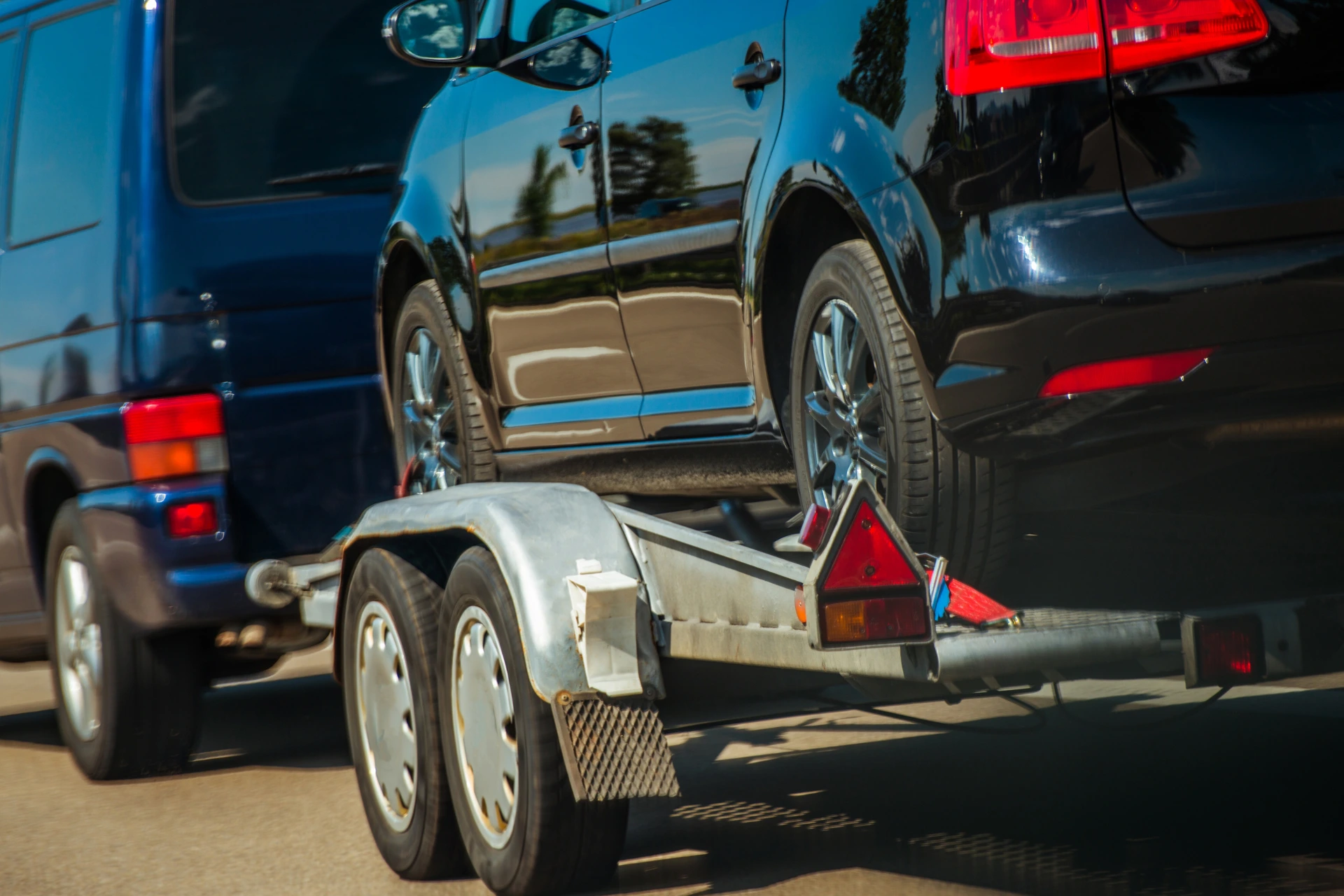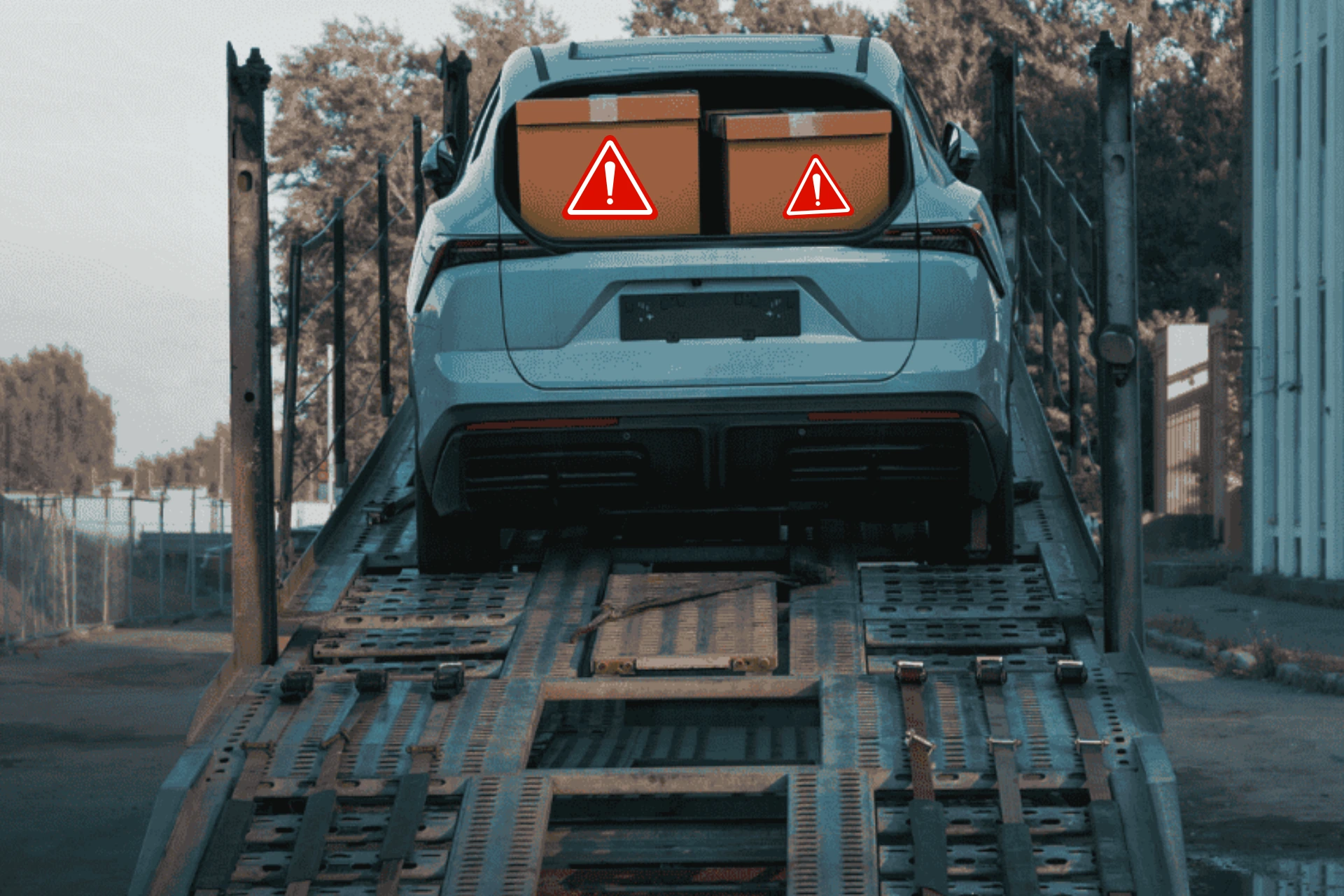Choosing between enclosed car shipping and open transport car shipping is one of the biggest decisions when moving a vehicle. The car shipping cost and level of protection are key factors.
At Transportvibe, we believe in making this choice simple, transparent, and informed. This comprehensive guide will help you understand the core differences, from car shipping prices and services to the pros and cons of each method.
Whether you’re moving a daily driver or a luxury vehicle, we’ll provide you with the information you need to find the best car shipping companies for your needs. Find out which option fits your budget and car type. Get a free car shipping quote from trusted providers today!
What is Open Car Shipping?
Open car shipping, also known as open transport car shipping, is the most common and economical way to transport vehicles. Your car is secured on a multi-level, open-air trailer, which typically carries 7 to 10 vehicles at once.
Advantages of Open Transport Car Shipping:
- Lower Car Shipping Cost: With the ability to transport more vehicles, car shipping companies can offer a significantly lower car shipping quote compared to enclosed options. This makes it an ideal choice for a cheap car shipping solution.
- Widespread Availability: There are far more open carriers on the road, making it easier to book a shipment and often resulting in faster pickup times.
- Practicality: It’s the most practical and cost-effective solution for standard sedans, SUVs, and trucks.
Disadvantages:
- Exposure: Vehicles are exposed to weather, road debris, and dirt.
- Less Security: While secure, the vehicle is visible to the public.
This method is the backbone of the auto transport industry, used by dealerships, manufacturers, and individuals for daily drivers.
What is Enclosed Car Shipping?
Enclosed car shipping offers the highest level of protection for your vehicle. Unlike open carriers, your car is loaded into a completely sealed trailer, shielding it from all outside elements.
Benefits of Enclosed Car Shipping:
- Maximum Protection: Your car is fully protected from rain, snow, hail, road debris, and dirt. This is particularly important for pristine paint finishes and antique vehicles.
- Enhanced Security: The enclosed trailer provides an extra layer of privacy and security, keeping your vehicle out of public sight and minimizing the risk of theft or vandalism.
- Specialized Handling: Drivers often use hydraulic lift gates and soft straps for careful loading and unloading, making this the preferred method for low-clearance or non-running vehicles.
Drawbacks:
- Higher Car Shipping Cost: This superior protection comes at a higher price. The car shipping prices for enclosed transport are typically 30-50% more than open transport.
- Limited Availability: There are fewer enclosed carriers, which can result in longer scheduling times and potential delays.
This premium car shipping service is a top choice for high-value, luxury, exotic, and classic cars.
5 Key Differences Between Open and Enclosed Car Shipping
Choosing between enclosed and open transport car shipping often comes down to these five key distinctions. Understanding these differences will help you make a confident decision, balancing car shipping cost, protection, and convenience for your specific vehicle and needs.
Price and Car Shipping Cost
The most significant difference between the two methods is the price.
Open transport car shipping is the more affordable option because carriers can transport more vehicles at once, making their routes more fuel-efficient and profitable. This allows them to provide a lower car shipping quote.
On the other hand, enclosed car transport is a premium car shipping service, with the added protection and specialized handling resulting in a higher car shipping cost. The price difference can be substantial, often 30% to 50% more for enclosed transport.
For many, this is the primary deciding factor, making open transport the go-to for a cheap car shipping solution. If you want to compare costs, use a reliable car shipping cost calculator.
Protection and Security
When it comes to safeguarding your vehicle, there’s no comparison.
Open transport, by its nature, leaves your car exposed to the elements and road debris. While carriers take precautions, your vehicle is susceptible to dirt, dust, rain, and potential rock chips.
Enclosed auto shipping, however, provides a fully sealed environment, protecting your vehicle from all of these hazards. This is why it’s the preferred choice for high-value or classic cars.
The enclosed trailer also offers greater security, keeping the vehicle hidden from view and reducing the risk of theft or vandalism.
Transport Speed and Availability
Open transport has a significant advantage in terms of scheduling and speed. Since there are many more open carriers on the road, it is much easier and faster to book a shipment. This makes it a great option for time-sensitive moves.
Enclosed car transport, due to the limited number of carriers and specialized routes, can have longer scheduling times. While a carrier might be available, they may not be on a route that matches your specific timeline, requiring more flexibility on your end.
Insurance Coverage
All professional car shipping companies are required to have insurance. However, the coverage limits can differ significantly between the two types of carriers.
Open carriers typically have a standard cargo insurance policy suitable for everyday vehicles. Because enclosed car shipping is used for higher-value cars, these carriers often carry higher insurance limits to provide adequate coverage for potential damage.
It is crucial to read the terms of the policy and confirm the coverage details with any carrier you consider. To learn more about what’s covered, see this guide on car shipping insurance.
Vehicle Type and Value
Your vehicle’s type and value are the ultimate determinants. For a standard sedan or SUV, open transport car shipping is a practical and economical choice.
However, if you are shipping a luxury, exotic, or antique vehicle, the added protection of enclosed car shipping is a worthwhile investment. The extra cost provides peace of mind that your valuable asset will arrive in the same condition it left in.
For insights into costs for different vehicle types, you can check out this external resource on shipping costs for various vehicles.
When to Choose Open Car Shipping
Open transport car shipping is the most popular choice for a reason—it’s practical, affordable, and widely available. This option is perfect for the average vehicle owner who needs a reliable and budget-friendly solution without the premium cost of enclosed transport.
Here’s when you should opt for open transport:
- You’re on a budget: If a lower car shipping cost is your main priority, open transport is the clear winner. The cost-saving can be significant, making it the ideal solution for anyone looking for cheap car shipping.
- You have a standard vehicle: This method is perfectly suited for everyday cars like sedans, SUVs, and trucks. Since these vehicles are built to withstand daily road conditions, they handle the exposure of open transport without issue. For a comprehensive look at the benefits of this service, check out our car transport guide.
- Availability and speed are crucial: Because there are far more open carriers, you’ll have greater flexibility with scheduling and faster pickup times, which is a major benefit for time-sensitive moves.
- The vehicle’s value is not exceptionally high: For cars that are not luxury, classic, or collector’s items, the risk of minor cosmetic wear from road debris is generally low and outweighed by the cost savings. For more information on open transport, check out our guide to open car shipping.
- For Shorter Distances: The length of your trip can also influence your decision. For shorter moves, the vehicle will spend less time exposed on the road, which further minimizes the potential for road debris or inclement weather damage.
When to Choose Enclosed Car Shipping
Enclosed car shipping is the premium choice for vehicle transport, offering unmatched protection and peace of mind. While the car shipping cost is higher, it is a necessary and worthwhile investment for certain types of vehicles.
Here’s when you should opt for enclosed transport:
- You own a high-value or luxury vehicle: For exotic sports cars, classic automobiles, or custom builds, protecting your investment from weather, road debris, and potential damage is non-negotiable. The peace of mind alone often justifies the higher car shipping prices.
- You are shipping a show car or antique: If your vehicle needs to arrive in pristine condition for an exhibition or event, enclosed transport is the only way to ensure it stays spotless and free from any cosmetic blemishes.
- You’re shipping through harsh climates: If your route includes regions with heavy snow, rain, or dirt roads, enclosed car shipping shields your vehicle from all these elements. This is especially important for classic vehicles that may be more vulnerable to corrosion or damage.
- You value privacy and security: The enclosed trailer keeps your vehicle out of public sight, adding an extra layer of security and discretion that open transport car shipping cannot provide.
To get an accurate car shipping quote for your high-end vehicle, be sure to use a specialized car shipping service. For more details on this option, read our guide to enclosed vehicle shipping.
Cost Factors in Both Methods
The final car shipping cost is a complex calculation influenced by several key factors that apply to both enclosed car shipping and open transport car shipping. Understanding these variables will help you better interpret your car shipping quotes and manage your budget effectively.
Distance and Route Demand
The distance your vehicle travels is a primary determinant of the car shipping prices. While longer distances generally cost more in total, the rate per mile often decreases for cross-country car shipping.
Routes that are popular and frequently traveled by car shipping companies tend to be more affordable than those to remote or less-populated areas, where carriers may have to go out of their way.
Vehicle Size and Weight
Larger and heavier vehicles like SUVs, trucks, and oversized vehicles will always cost more to ship. They take up more space on the trailer, reduce the carrier’s overall capacity, and increase fuel consumption.
This is a crucial factor to consider when getting a car shipping estimate, as the added fees for a larger vehicle can significantly impact your final car shipping cost calculator results.
Time of Year and Seasonal Demand
The time of year you ship your car has a major impact on car shipping rates. Demand surges during peak seasons, such as summer and the “snowbird” season (fall and spring), when many people are moving. This increased demand leads to higher prices.
Shipping during the off-season, particularly in winter, can often result in lower rates. For more on this, check out our guide on the best time of year to ship a car.
Additional Services
While a standard car shipping service includes basic transport, extra services will raise your car shipping costs. Door-to-door delivery, while convenient, can be more expensive if your home is in a difficult-to-access area.
Expedited shipping guarantees a faster pickup and delivery but comes with a premium fee. Many of the best car shipping companies also offer real-time tracking, which may be included or an add-on service.
Tips for Choosing a Reliable Car Shipping Company
Finding a trustworthy car shipping company is paramount to a successful move, whether you opt for open transport car shipping or enclosed car shipping. With so many providers available, it’s essential to do your homework to avoid potential scams or bad experiences.
Check Licensing and Insurance
A legitimate car shipping service must be registered with the Federal Motor Carrier Safety Administration (FMCSA) and have a valid U.S. Department of Transportation (DOT) number. This is your first and most important step. You can use the FMCSA’s website to verify a company’s credentials, safety record, and insurance status. Always ask for proof of insurance and understand the coverage limits.
Read Reviews and Ratings
Don’t just rely on a company’s website; look for honest, third-party car shipping reviews on platforms like Transportvibe, Google, or the Better Business Bureau. Pay attention to patterns in feedback, both positive and negative, and see how the company responds to customer complaints. This will give you a realistic idea of their customer service and reliability.
Compare Multiple Quotes
Use a car shipping cost calculator to get a baseline car shipping estimate from several providers. Be wary of quotes that are drastically lower than the industry average, as they often come with hidden fees or indicate a less-than-reputable service. Compare the services included in each quote, not just the final car shipping cost.
Visit Transportvibe to explore vetted auto transport providers, compare quotes, and find answers to all your car shipping questions.
Ask Detailed Questions
A reputable company will be transparent and willing to answer all your questions about the shipping process, their insurance, and what to expect. Don’t be afraid to ask for specifics.
For more guidance on what to look for, visit the FMCSA website to check a company’s safety rating before you book.
Clearing Up the Confusion – Open or Enclosed?
Is enclosed car shipping worth the extra cost?
Yes, it is, for high-value, luxury, or classic cars. The added protection from weather and road debris justifies the higher car shipping cost to preserve the vehicle’s pristine condition.
How much more expensive is enclosed car transport compared to open?
Enclosed car shipping typically costs 30% to 50% more than open transport car shipping due to lower carrier capacity and specialized equipment.
Can I ship a motorcycle or specialty vehicle in an enclosed trailer?
Yes, enclosed trailers are often the best choice for motorcycles and specialty vehicles due to the superior protection and handling they provide. For more on this service, visit our enclosed motorcycle shipping page.
Does open car shipping include insurance?
Yes, all reputable car shipping companies are legally required to carry cargo insurance, which is included in your car shipping quote.
How long does it take to ship a car in either method?
Shipping times vary by distance, but open transport is generally faster to book and can have quicker delivery times. A cross-country move typically takes 7-14 days.
Can I pack personal items in my car during transport?
Most car shipping services advise against this. Personal items are usually not covered by the carrier’s insurance, and extra weight can impact your car shipping prices.
What happens if my car gets damaged during shipping?
You should document any damage on the Bill of Lading (BOL) before the driver leaves. This document is essential for filing a claim with the carrier’s insurance. A good car shipping company will have a transparent claims process.
Making Your Final Transport Decision
Choosing between enclosed car shipping and open transport car shipping ultimately depends on your priorities. If your main concern is car shipping cost and you have a standard vehicle, open transport provides an affordable and efficient solution.
However, for luxury cars, classics, or high-value vehicles, the premium protection of enclosed transport is a worthwhile investment.
At Transportvibe, our goal is to empower you with the right information. We help you compare car shipping quotes from the best car shipping companies, so you can make a confident decision that fits your budget and needs. Don’t leave your vehicle’s journey to chance.Ready to find the right transport service for you? Get a free, no-obligation car shipping estimate today!















